 Biography: Heather Simeney MacLeod
Biography: Heather Simeney MacLeod grew up in various regions through out British Columbia. Her
first book of poems,
My Flesh the Sound of Rain, was published in 1998 by
Coteau Books;
The Shape of Orion, a chapbook with
Smoking Lung Press was released in 2002;
The Burden of Snow, a
second full collection of poetry with
Turnstone Books came out in 2004. Her plays have been produced in Canada and Scotland, and she has received honourable mentions from two contests. Her
poetry and fiction have been
published in numerous Canadian literary journals and
anthologies as well as appearing in reviews and journals in the United States, the United Kingdom, Ireland, Australia, New Zealand and Israel. She’s currently a doctoral student at the University of Alberta.
1. How did your first book change your life?
When
Geoffrey Ursell rang me to tell me
Coteau Books wanted to publish my first book I was giddy. I had just returned from
Turkey and was staying with my family in the Northwest Territories and had a plane ticket to return to Europe. I kept holding up books at random and saying to my brother, “Different name, different title, different cover, but same idea. This will be me.” This still strikes me as hilarious. I worked with my editor,
Patrick Lane, from a friend’s flat in
Freiburg, Germany. It was a strange feeling to be reworking poems primarily set in Canada, and then to go out onto the canals and cobbled walkways of
Freiburg. I returned to Canada for the launch and readings. I think what the first book publication did was indicate to myself that I was, you know, a poet. It said to me: you are a writer.
2. How long have you lived in Alberta, and how does geography, if at all, impact on your writing? Does race or gender make any impact on your work?
I moved here, to Edmonton, this past August. I’ve found, in my own work, that geography and race have had a profound impact. My work is influenced by my physical location. The poems I wrote in and after living in Turkey are infused with silk on silk carpets and apple tea, and the poems and stories I wrote in and after living in Scotland are soaked in rain and dipped in that strange, muted light of Edinburgh. My second collection of poetry consists of a series of hauntings of race, ancestry and geography.
Strangely my plays seem least affected by geography, and the most profoundly affected by gender. When I am writing poems and fiction I don’t think I’m as aware of gender, or it feels as if it is somehow less present. When I am working on plays, though, gender seems omnipresent.
3. Where does a poem usually begin for you? Are you an author of short pieces that end up combining into a larger project, or are you working on a “book” from the very beginning?I’ve noticed that usually I begin writing from an image, and have noticed that sometimes the image doesn’t even necessarily appear in the final draft. Many of the images, naturally, emerge from my own experiences ―an
Appaloosa in a meadow at daybreak, my grandfather’s cowboy boots, the feel of bit and bridle, the hills and valleys of
the interior of British Columbia, Saint Sophia covered in mist,
Morningside Road after the first snowfall of winter,
Saint Cuthbert’s in the sunshine.
My first collection of poetry consisted of short pieces that I ended up combining into a larger project. I found that an awkward sort of thing to do, you know? To try to make sometimes very disparate pieces fit together into a whole. Consequently, after that experience I’ve noticed I tend to work on manuscripts rather than individual pieces. I think of my work as fitting together into a greater whole. It’s important, to me, that each piece stand outside of the whole on its own, and yet that each piece support, weave through the manuscript.
4. Are public readings part of or counter to your creative process?
I think of readings as necessary and as fairly uncomfortable, but don’t find they affect my creative process at all.
5. Do you have any theoretical concerns behind your writing? What kinds of questions are you trying to answer with your work? What do you even think the current questions are?
Theoretical concerns emerge, but I’m normally concerned about the nuts and bolts aspect of writing initially. You know, the development of character, plot, consistency, believability takes up most of my attention in the beginning stages. It is in subsequent drafts I’ll notice broader theoretical concerns and themes, and it is at that point I will attempt to tune them, to ensure they are operating in a cohesive manner with the rest of the work.
I think within much of my work I am concerned with identity and how to articulate it, and the manner it is disrupted and dislocated.
I’ve noticed within the department (I’m currently enrolled in the PhD program at the University of Alberta) there are numerous theoretical queries going-on, obviously. One of my cohorts is interested in landscape and the ways in which it is manipulated by our intentions as well as the ethics of socio-environmental conflict, which I’ve found (through her discussion) quite interesting. Though, I don’t know if I would go so far as to claim it is a “current question,” but certainly our environment in general is a current concern.
6. Do you find the process of working with an outside editor difficult or essential (or both)?
It depends on the editor. Really depends on how the editor approaches not only me, but also my work. I think the process is vital and as you said essential for the work. It can be, again depending upon the situation, difficult or exciting and invigorating.
7. After having published more than a couple of titles over the years, do you find the process of book-making harder or easier?
I find the writing is about the same. You know, you sit down and you plug away at it. Though I do think in terms of a manuscript ― I don’t allow that to affect the work I’m doing. When writing, I find my attention is pulled directly to the particular piece be it a poem, chapter, or scene. The publishing aspect is as tedious as ever.
8. When was the last time you ate a pear?It was before Christmas. It wasn’t quite ripe. I like to keep most fruit in the fridge so it was sour and cold. It was a crunchy affair.
9. What is the best piece of advice you've heard (not necessarily given to you directly)?I was in Seattle several years ago. I’d recently returned to North America from Germany, and I was finding the transition (for a number of personal reasons) very difficult. I was sitting in
Fremont with my friend Katy. We were having café au lait and biscuits. I was really concerned with “sorting” my life as if it were something I could whittle down and compartmentalize. I looked up, and down this long hallway written in large letters on a blackboard was: You can’t change your life over night. At that time I was horrified. Could that be true? Remember thinking, “What a nightmare.” I think of it often with fluctuating emotions. Sometimes when I think, “You can’t change your life over night,” I feel vast waves of relief; other times I feel intense irritation. In any event I think it is the best advice I’ve ever stumbled across.
10. How easy has it been for you to move between genres (poetry to writing plays)? What do you see as the appeal?I naturally move between genres. You know, as a reader I am (obviously) very aware of genre, but as a writer genre somehow sits somewhere else. It isn’t a focus, and genre when I’m writing is barely even a consideration. The image will emerge and it carries with it, I think, genre. I don’t impose the mode of writing, rather I write whatever it wants to be. That sounds strange, I know. I don’t think I’m attracted (for lack of a better word) to one genre over another. As a reader what appeals to me are the genres of fantasy and science fiction neither of which I write.
11. What kind of writing routine do you tend to keep, or do you even have one? How does a typical day (for you) begin?
Honestly, I like to stay in bed and stare at the ceiling. I like to stare at the ceiling a lot. I think of staring at the ceiling as a hobby. In my spare time, yep, I like to stare at the ceiling. When I get tired of staring at the ceiling I like café au lait. I picked up a little milk-froth-maker-thingy from Ikea yesterday. I love it. I love it almost as much as I love staring at the ceiling. That’s the beginning of my day. I like to write every day. I usually break it up into patches in the morning and evening, but that really depends on the overall structure of my day. If I’m working I usually write late-afternoon.
12. When your writing gets stalled, where do you turn or return for (for lack of a better word) inspiration?I usually don’t panic over being stalled as I normally turn my attention to rewriting, but if the “stall” continues I’ll turn to books ―
Karen Solie,
Catherine Greenwood,
Rebecca Fredrickson,
Seamus Heaney,
Kathleen Jamie,
Jeanette Winterson,
Tim Winton,
Cormac McCarthy to name a few.
13. How does your most recent book compare to your previous work? How does it feel different?
There was a six year gap between my two collections of poetry.
My Flesh the Sound of Rain comes from this melting of experiences ―an undergrad experience at the
University of Victoria, a transitory kind of migratory living between Victoria and Yellowknife as well as a series of long, intense travels to Britain and Europe. The second collection,
The Burden of Snow, is not as varied nor as tumultuous. Rather, it is (not unlike my life at the time) centred and solid with guided curiousity. The second book feels far different than the first. It feels much softer and yet more solid.
14. David W. McFadden once said that books come from books, but are there any other forms that influence your work, whether nature, music, science or visual art?I like the paintings of
Christopher Wood,
Gertrude Degenhardt,
Robert Genn, Eadain Hunter as well I am often inspired by the photos and paintings of friends such as
Deborah Rossouw, Justin Thomas,
Greg McBrady, Pat Kichen, Kristy Lewis,
Katy Ellis and the travel photographs by Genevieve Lacourciere. The music of
Rilo Kiley,
Devendra Banhart,
Sia,
Gillian Welch, and
Johnny Cash inspires me.
15. What other writers or writings are important for your work, or simply your life outside of your work?
I’m sometimes influenced by non-fiction work. Books on trains,
the journey of the turtle; sometimes I’m influenced by a series of words for example all the names there are for the different formations of clouds; geography endlessly pulls at me for, I think I may have inherited this from my mother, I believe it offers an endless route away from myself. This isn’t true.
A few friends have been inspirational through their letters, conversations, their photographs. The writer
Rebecca Fredrickson has often, through her own work and through our conversations, influenced my own writing. The personal writings and photographs from Mary Finlay-Doney have been inspirational. Of course, the writing and photographs of Katy E. Ellis Jr. have inspired and influenced my writing.
16. What would you like to do that you haven't yet done?I haven’t traveled into Asia. I’d like to see the rice paddies, saffron-robed monks, buddhas that defy description. I’d like to stand amid
parrots in
Central America, camp amid
Mayan and
Aztec ruins (can you do that?). I’d like to go to
Easter Island. I’d like to go
St. Petersburg and
Moscow. My friend, Indio, tells me
Buenos Aires has
more neon lights than any city has a right too. I want to see that. Oh, what about
Peru? I’d like to snorkel, surf ―I’m a bad swimmer (really) and I’m a wee bit afraid of the water (really). Publish a novel, a collection of short stories. Have dinner with
Stephen King? Maybe I’m getting a bit carried away here, whatdaya think rob?
17. If you could pick any other occupation to attempt, what would it be? Or, alternately, what do you think you would have ended up doing had you not been a writer?I don’t know. If I could pick another occupation maybe architectural design something where the beautiful would be functional, and if I weren’t a writer I’d probably have ended up in photography, or maybe pottery.
18. What made you write, as opposed to doing something else?Again, I really don’t know. I like writing because, of course, I like the sounds of words. I make lists of words: chesterfield, elbow, appaloosa, palomino, bit and bridle. I’m also very attracted to lines in films and television. When
McCoy says to
Kirk, “
Good God Jim, I’m a doctor not a bricklayer.” I try to fit that into as many conversations as I can. There’s a line from
Glengarry Glen Ross that has been rippling over the tv screen lately (advertisement for
the movie upcoming on some channel or another), “You see this watch? This watch cost more than your car.” Every time I hear it I smile. It cracks me up. I love many lines from
Buffy the Vampire Slayer as well as the last sentiments on her gravestone:
She Saved the World. A lot.
19. What was the last great book you read? What was the last great film?I’m a fan of
Wes Anderson and saw his film
The Darjeeling Ltd. just before Christmas. I’m currently reading
Lullabies for Little Criminals by
Heather O’Neill, and think it incorporates many of the elements I would like to see emerge in my own work. An ease with language, for example, as well
O’Neill’s sense of place is loose and yet exact.
20. What are you currently working on?
Mostly, as I am a PhD candidate at the
University of Alberta, I’m working on homework. I’m in a class of
Christine Wiesenthal’s [
see her 12 or 20 questions here] and have been trying my hand at creative non-fiction. When time permits I’m rewriting a novel and working on a series of short fiction.
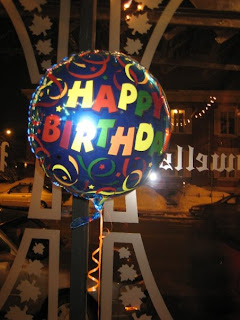


 Lovely Jenn Farr (check her green hair for St. Patrick's Day) and her pal Eliza Von Baeyer, sitting at Pubwell's. I also learned, that day, that the Pope had decreed my birthday the official Feast of St. Patrick, so it wouldn't interfere with Holy Week (just so you know, the "snakes" were, ahem, Protestants, Druids & other "heathens"). Another reason to hate the Irish; bad enough they had the parade on my birthday and refused to acknowledge me. Oh, Irish people, what have I ever done to you?
Lovely Jenn Farr (check her green hair for St. Patrick's Day) and her pal Eliza Von Baeyer, sitting at Pubwell's. I also learned, that day, that the Pope had decreed my birthday the official Feast of St. Patrick, so it wouldn't interfere with Holy Week (just so you know, the "snakes" were, ahem, Protestants, Druids & other "heathens"). Another reason to hate the Irish; bad enough they had the parade on my birthday and refused to acknowledge me. Oh, Irish people, what have I ever done to you?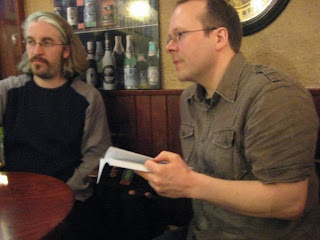
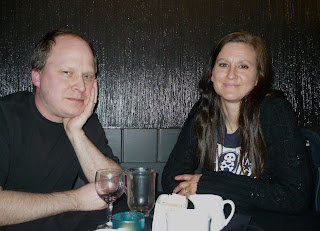


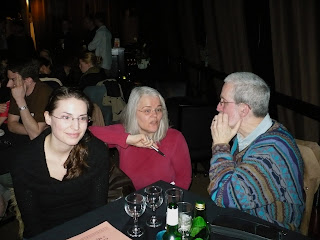
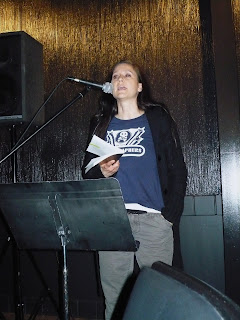
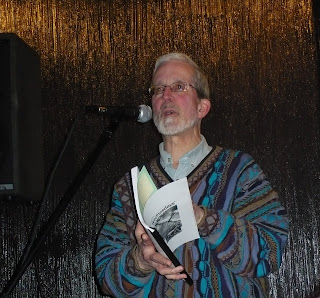
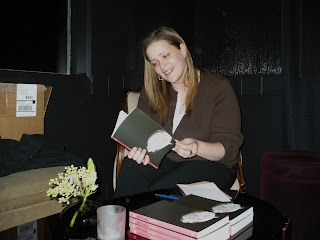 The lovely bookseller; why didn't I learn her name?
The lovely bookseller; why didn't I learn her name? Kristy McKay, looking very cute (as always);
Kristy McKay, looking very cute (as always);  I did a reading at the Red Deer College Library, lovingly organized & hosted by my new best friend & Brick Books author, Joan Crate. Even though she handed me the cheque before the reading got started, I stayed & even read to a good group of interested students & non-students alike (despite my attempts to get a few of them, pre-reading, to run off with me).
I did a reading at the Red Deer College Library, lovingly organized & hosted by my new best friend & Brick Books author, Joan Crate. Even though she handed me the cheque before the reading got started, I stayed & even read to a good group of interested students & non-students alike (despite my attempts to get a few of them, pre-reading, to run off with me).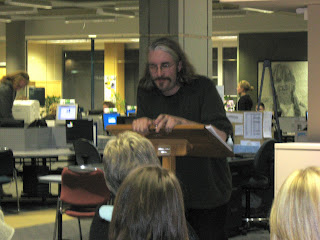

 And then there were these things, that shoot water from the front (I want one);
And then there were these things, that shoot water from the front (I want one); And then there were these things, that shoot water from the front (I want one);
And then there were these things, that shoot water from the front (I want one);
